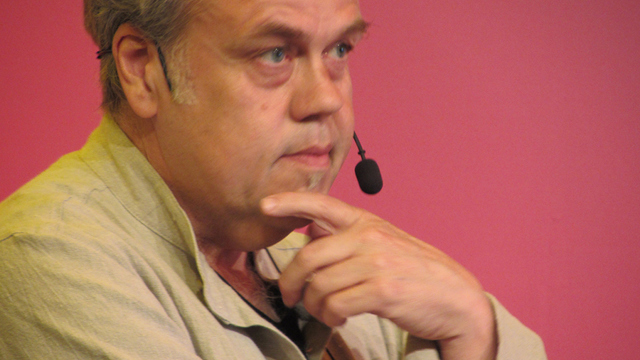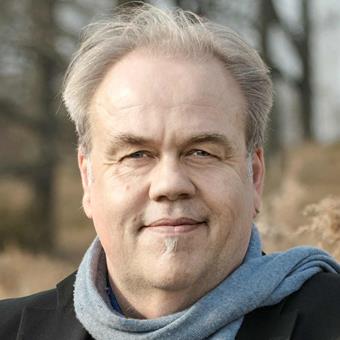The Swedish Energy Agency has now approved financing for the first two years of what will hopefully be a ten-year investment into a biogas research centre at Linköping University (LiU). If everything goes according to plan, the biogas research centre will have an annual budget of SEK 21 million once it is up and running in a year’s time, which translates into a total investment of SEK 190 million. Financing will be divided evenly between academia, industry and the Swedish Energy Agency.
 Foto: Monica Westman“We begin work in earnest after the summer, then we’ll gradually increase activities during the first two years so that by year three we’ll be fully operational,” says Mats Eklund, professor of Environmental Technology and Management (Envtech) at Linköping University.
Foto: Monica Westman“We begin work in earnest after the summer, then we’ll gradually increase activities during the first two years so that by year three we’ll be fully operational,” says Mats Eklund, professor of Environmental Technology and Management (Envtech) at Linköping University.
“Many divisions at LiU are involved in this, and we cover the entire range from microbiology and technology to social sciences. This broad consolidation will also strengthen the industry."
Numerous actors, such as biogas companies and Linköping municipality, are stakeholders in the centre, which creates a good basis for successful research together with researchers at LiU.
“This is an indication by the authorities that they believe in us. We see major challenges in the transport sector today, and this initiative will contribute to our finding alternative solutions that reduce carbon dioxide emissions and climate effects,” says Bahram Moshfegh, professor of the Division of Energy Systems at Linköping University.
Bo Svensson, professor of Water and Environmental Studies, is also looking forward to the biogas collaboration.
“The establishment of a biogas centre gives us a very powerful shared research platform,” he points out.
“Great to get a positive response, and particularly encouraging since we’ve put in a lot of work and succeeded in shaping a good research programme and a strong network together,” says Jonas Ammenberg, senior lecturer at the Division for Environmental Technology and Management, and coordinator of the entire initiative.
“No-one then would have imagined that the collaboration between research, municipalities and business would lead to a biogas research centre at the national level. That we are now receiving this acknowledgement is hugely satisfying,” Mats Eklund says.
“A very pleasing response from the Energy Agency,” says Paul Lindvall, chairman of the municipal executive board in Linköping. The biogas research centre will strengthen Linköping’s position as a centre for biogas in Sweden. It is an important part of the long-term investment in biogas that Linköping municipality is making together with Linköping University and the business community.
Biogas research at LiU is run today by:
Energy Systems at LiU
Environmental Technology and Management at LiU
Department of Management and Engineering
Water and Environmental Studies (WES)
Department of Thematic Studies - Technology and Social Change Unit
Groups for Biochemistry, Biology and Surface Physics and Chemistry
Department of Physics, Chemistry and Biology
 Foto: Monica Westman“We begin work in earnest after the summer, then we’ll gradually increase activities during the first two years so that by year three we’ll be fully operational,” says Mats Eklund, professor of Environmental Technology and Management (Envtech) at Linköping University.
Foto: Monica Westman“We begin work in earnest after the summer, then we’ll gradually increase activities during the first two years so that by year three we’ll be fully operational,” says Mats Eklund, professor of Environmental Technology and Management (Envtech) at Linköping University.
Interdisciplinary approach
One of the things that make the Linköping initiative different from other biogas initiatives in other parts of the country is its broad and interdisciplinary approach. Eklund explains:“Many divisions at LiU are involved in this, and we cover the entire range from microbiology and technology to social sciences. This broad consolidation will also strengthen the industry."
Numerous actors, such as biogas companies and Linköping municipality, are stakeholders in the centre, which creates a good basis for successful research together with researchers at LiU.
“This is an indication by the authorities that they believe in us. We see major challenges in the transport sector today, and this initiative will contribute to our finding alternative solutions that reduce carbon dioxide emissions and climate effects,” says Bahram Moshfegh, professor of the Division of Energy Systems at Linköping University.
Bo Svensson, professor of Water and Environmental Studies, is also looking forward to the biogas collaboration.
“The establishment of a biogas centre gives us a very powerful shared research platform,” he points out.
“Great to get a positive response, and particularly encouraging since we’ve put in a lot of work and succeeded in shaping a good research programme and a strong network together,” says Jonas Ammenberg, senior lecturer at the Division for Environmental Technology and Management, and coordinator of the entire initiative.
Biogas-fuelled buses since 1992
The biogas initiative in Linköping started back in 1992, when the first biogas-fuelled buses began to operate on the city’s streets.“No-one then would have imagined that the collaboration between research, municipalities and business would lead to a biogas research centre at the national level. That we are now receiving this acknowledgement is hugely satisfying,” Mats Eklund says.
“A very pleasing response from the Energy Agency,” says Paul Lindvall, chairman of the municipal executive board in Linköping. The biogas research centre will strengthen Linköping’s position as a centre for biogas in Sweden. It is an important part of the long-term investment in biogas that Linköping municipality is making together with Linköping University and the business community.
Biogas research at LiU is run today by:
Energy Systems at LiU
Environmental Technology and Management at LiU
Department of Management and Engineering
Water and Environmental Studies (WES)
Department of Thematic Studies - Technology and Social Change Unit
Groups for Biochemistry, Biology and Surface Physics and Chemistry
Department of Physics, Chemistry and Biology
